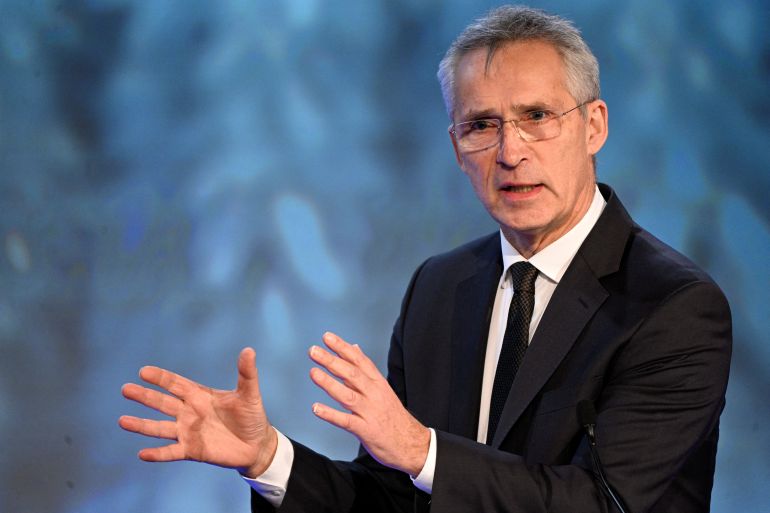NATO chief hints at more heavy weapons deliveries to Ukraine
Jens Stoltenberg says he expects more weapons deliveries to war-torn Ukraine after UK pledges Challenger 2 tanks.

NATO Secretary General Jens Stoltenberg has hailed recent pledges of heavy weapons deliveries from Western allies to Ukraine, saying he expected more “in the near future”.
The head of the transatlantic military alliance made the comments on Sunday, a day after a wave of Russian attacks across Ukraine again targeted critical infrastructure and left at least 30 people dead after a residential building was hit in the east-central city of Dnipro.
Keep reading
list of 3 itemsDeaths, blackouts as Russian missiles hit multiple Ukraine cities
Russia-Ukraine war: List of key events, day 326
“The recent pledges for heavy warfare equipment are important — and I expect more in the near future,” Stoltenberg told Germany’s Handelsblatt daily ahead of a meeting on Friday of defence officials from the bloc meant to coordinate arms transfers to Kyiv. What NATO refers to as the Ukraine Defense Contact Group is set to hold its third meeting at the US Ramstein Air Base in the German state of Rhineland-Palatinate on Friday.
Asked whether Germany must also move to provide heavier weapons to Ukraine, Stoltenberg said: “We are in a decisive phase of the war. We are experiencing fierce fighting. Therefore, it is important that we provide Ukraine with the weapons it needs to win — and to continue as an independent nation.”
On Saturday, Ukrainian President Volodymyr Zelenskyy called for more heavy Western weapons, saying that Russian “terror” could be stopped only on the battlefield.
“What is needed for this? Those weapons that are in the warehouses of our partners,” Zelenskyy said in his nightly address.
He spoke shortly after United Kingdom Prime Minister Rishi Sunak pledged to provide Challenger 2 tanks to Ukraine, making it the first Western country to supply heavy tanks to Kyiv.
Poland and Finland have also signalled their willingness to provide Ukraine with the German-made Leopard 2 tanks, increasing pressure on German Chancellor Olaf Scholz and his coalition government.
The trend represents a possible wider shift for European allies, who have resisted directly supplying Ukraine with heavy weapons since Russia’s invasion began on February 24, 2022.
It comes amid Russian claims of its first significant battlefield success after months of losses and stagnation, with Russia’s defence ministry announcing last week that it “completed the liberation” of Soledar, a city close to the transport crossroads of Bakhmut in the eastern Donetsk region.
Ukraine has denied the claims and said heavy fighting continued in Soledar.
The US-based Institute for the Study of War said on Sunday that “Ukrainian forces are highly unlikely to still hold positions within the settlement of Soledar itself”.